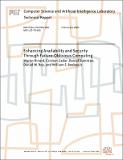| dc.contributor.author | Rinard, Martin | |
| dc.contributor.author | Cadar, Cristian | |
| dc.contributor.author | Dumitran, Daniel | |
| dc.contributor.author | Roy, Daniel M. | |
| dc.contributor.author | Jr., William S. Beebee | |
| dc.contributor.other | Computer Architecture | |
| dc.date.accessioned | 2005-12-22T01:19:21Z | |
| dc.date.available | 2005-12-22T01:19:21Z | |
| dc.date.issued | 2004-02-06 | |
| dc.identifier.other | MIT-CSAIL-TR-2004-005 | |
| dc.identifier.other | MIT-LCS-TR-935 | |
| dc.identifier.uri | http://hdl.handle.net/1721.1/30446 | |
| dc.description.abstract | We present a new technique, failure-oblivious computing,that enables programs to continue to execute through memoryerrors without memory corruption. Our safe compilerfor C inserts checks that dynamically detect invalid memoryaccesses. Instead of terminating the execution or throwingan exception, the generated code simply discards invalidwrites and manufactures values to return for invalid reads,enabling the program to continue its normal execution.We have applied failure-oblivious computing to a set ofwidely-used programs that are part of the Linux-based opensourceinteractive computing environment. Our results showthat our techniques 1) make these programs invulnerableto known security attacks that exploit memory errors, and2) enable the programs to continue to operate successfullyto service legitimate requests and satisfy the needs of theirusers even after attacks trigger their memory errors. | |
| dc.format.extent | 10 p. | |
| dc.format.extent | 21109742 bytes | |
| dc.format.extent | 788444 bytes | |
| dc.format.mimetype | application/postscript | |
| dc.format.mimetype | application/pdf | |
| dc.language.iso | en_US | |
| dc.relation.ispartofseries | Massachusetts Institute of Technology Computer Science and Artificial Intelligence Laboratory | |
| dc.title | Enhancing Availability and Security Through Failure-Oblivious Computing | |

